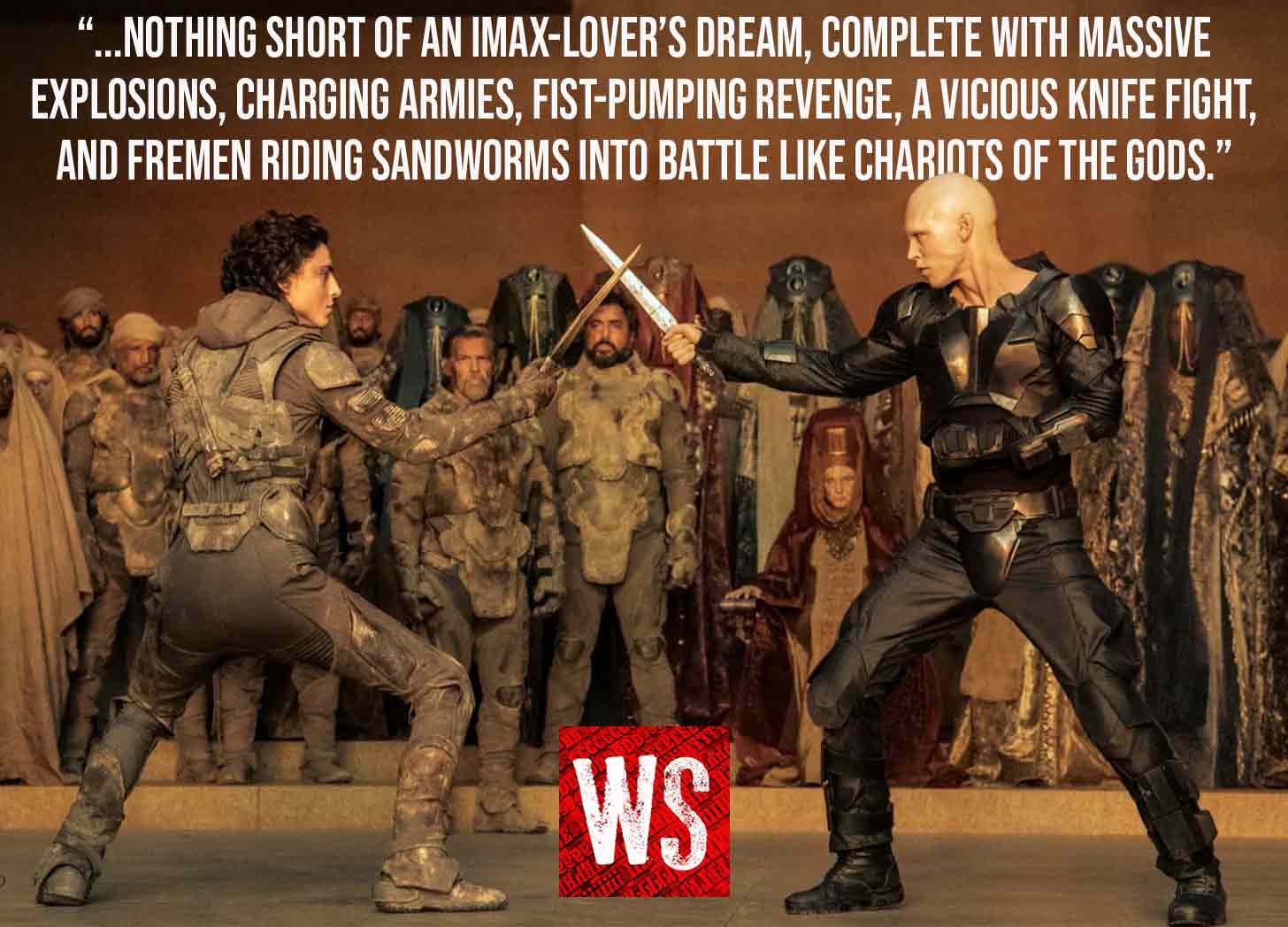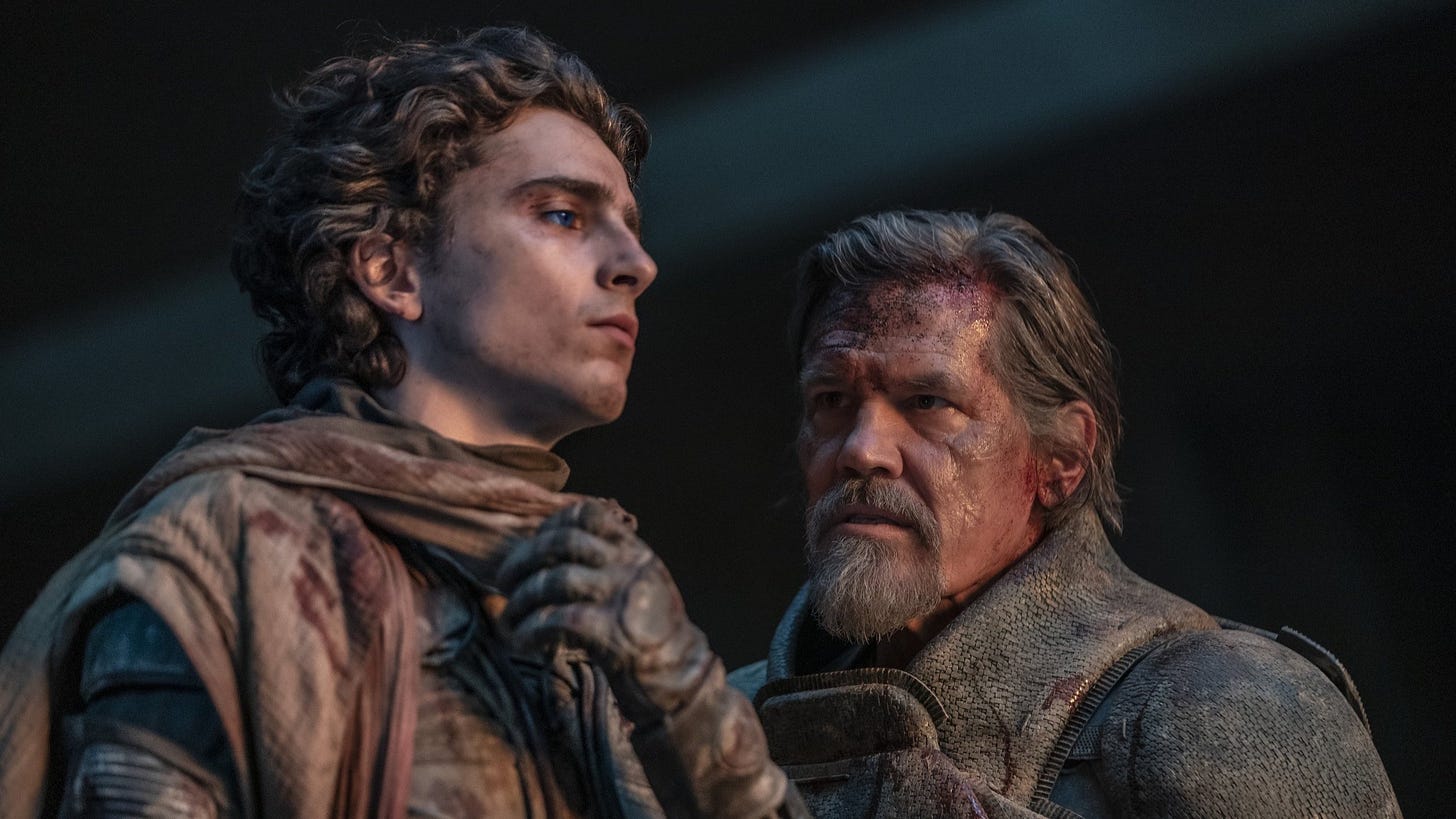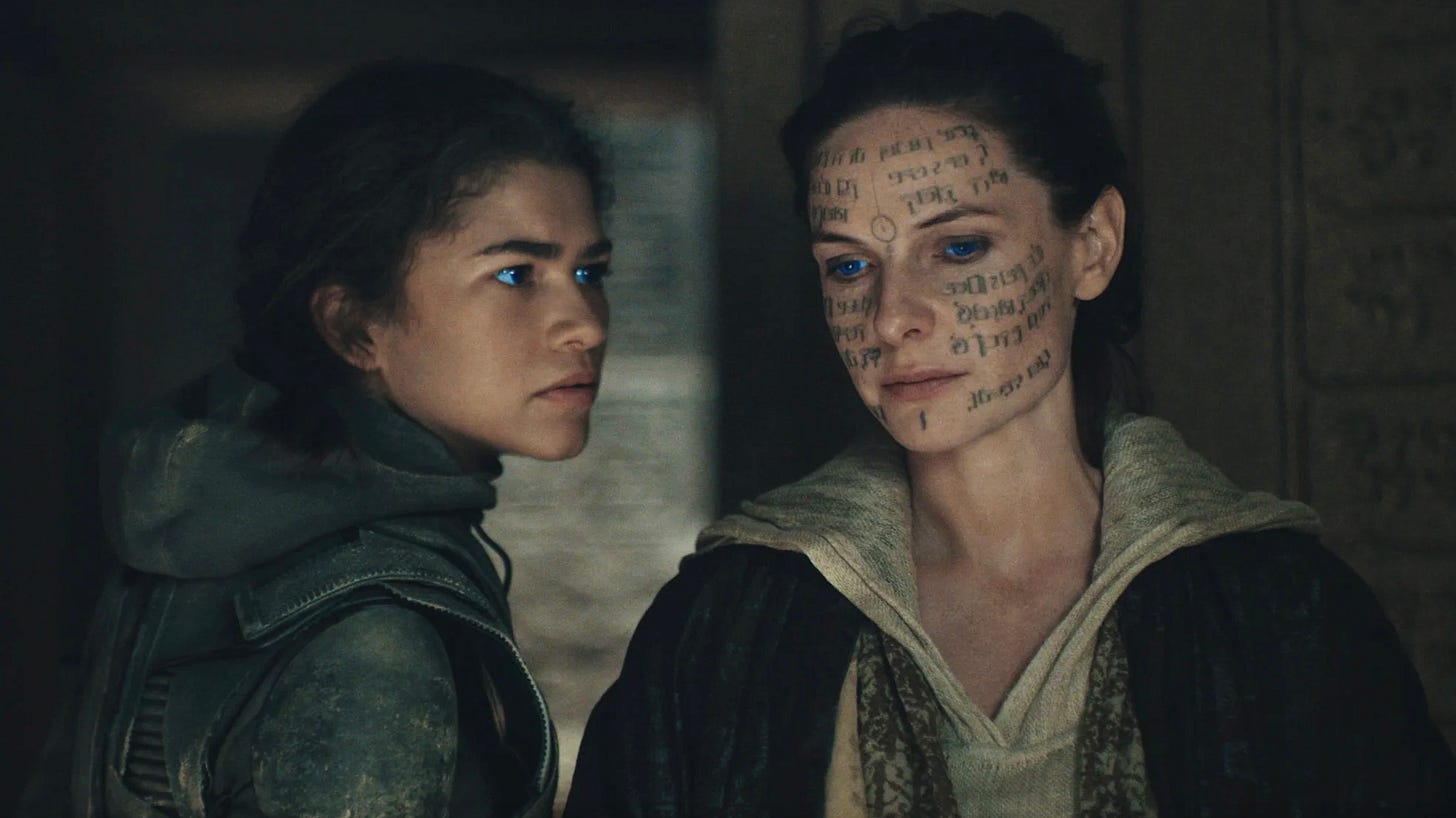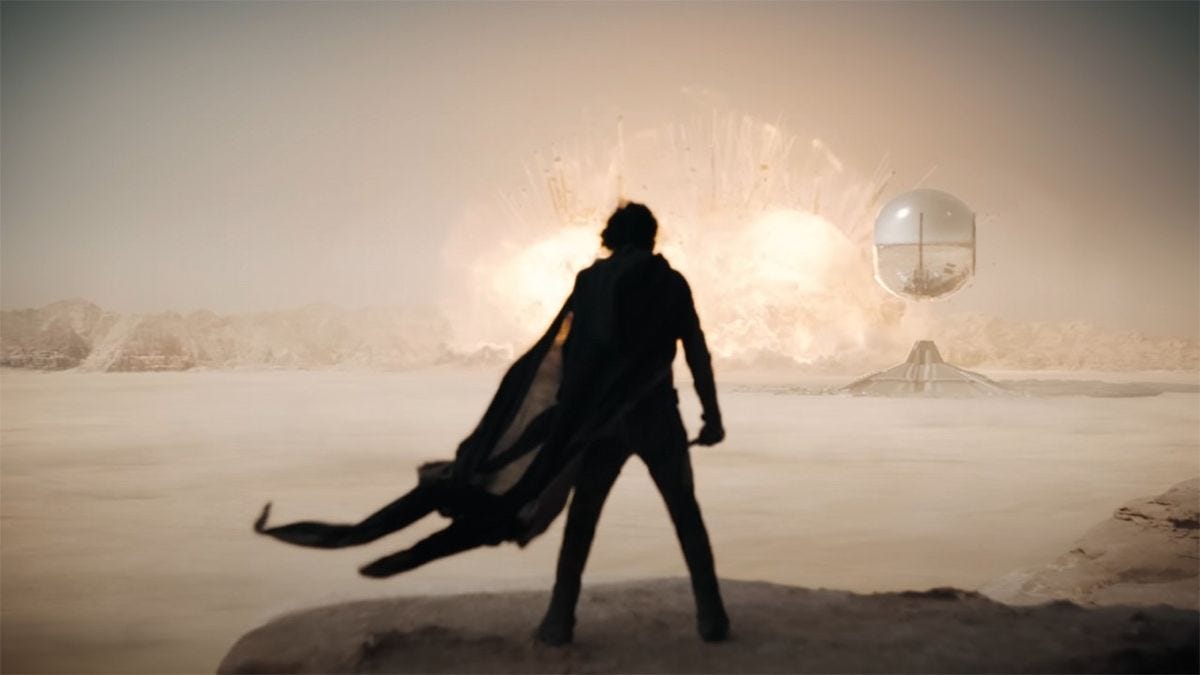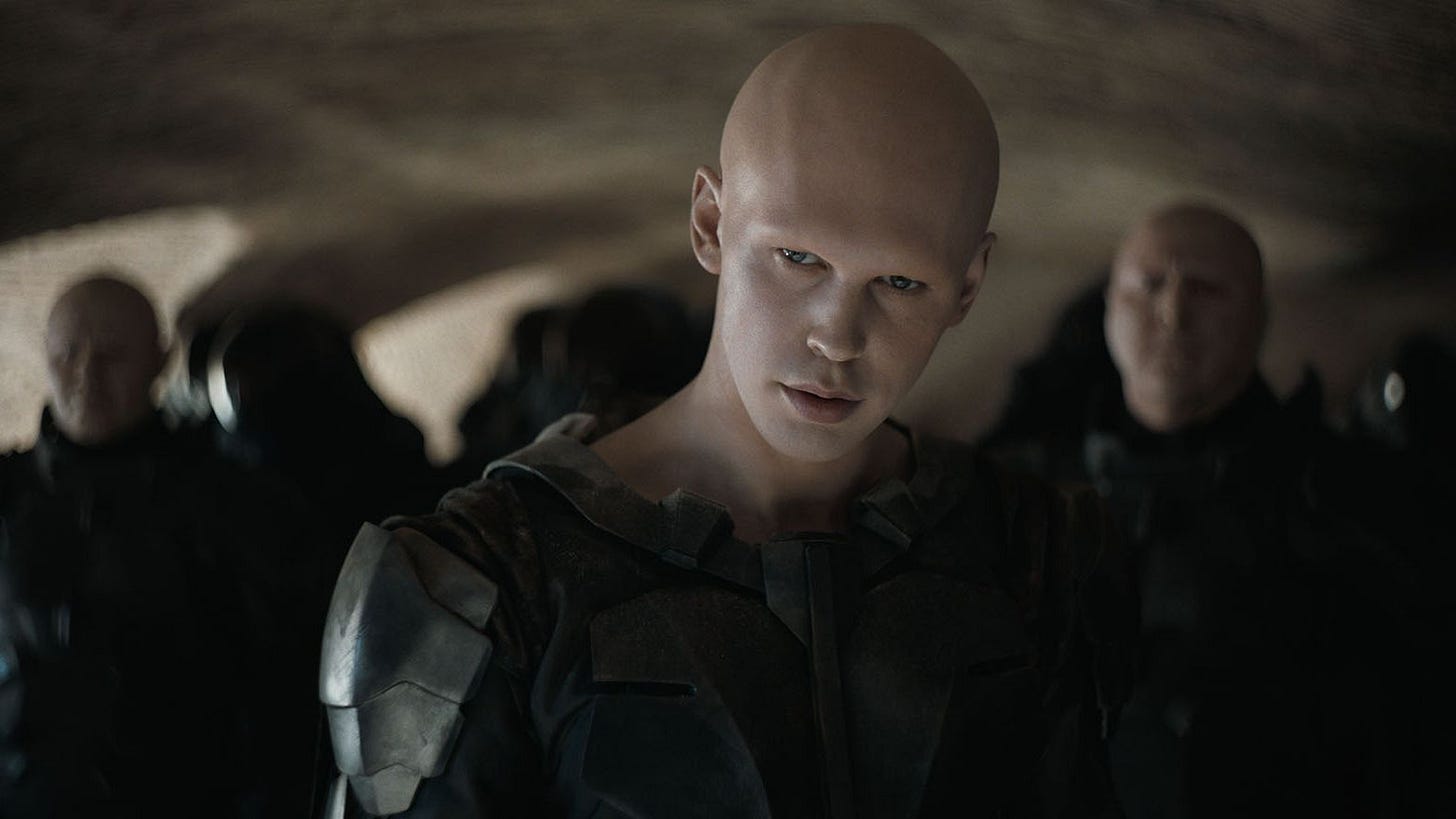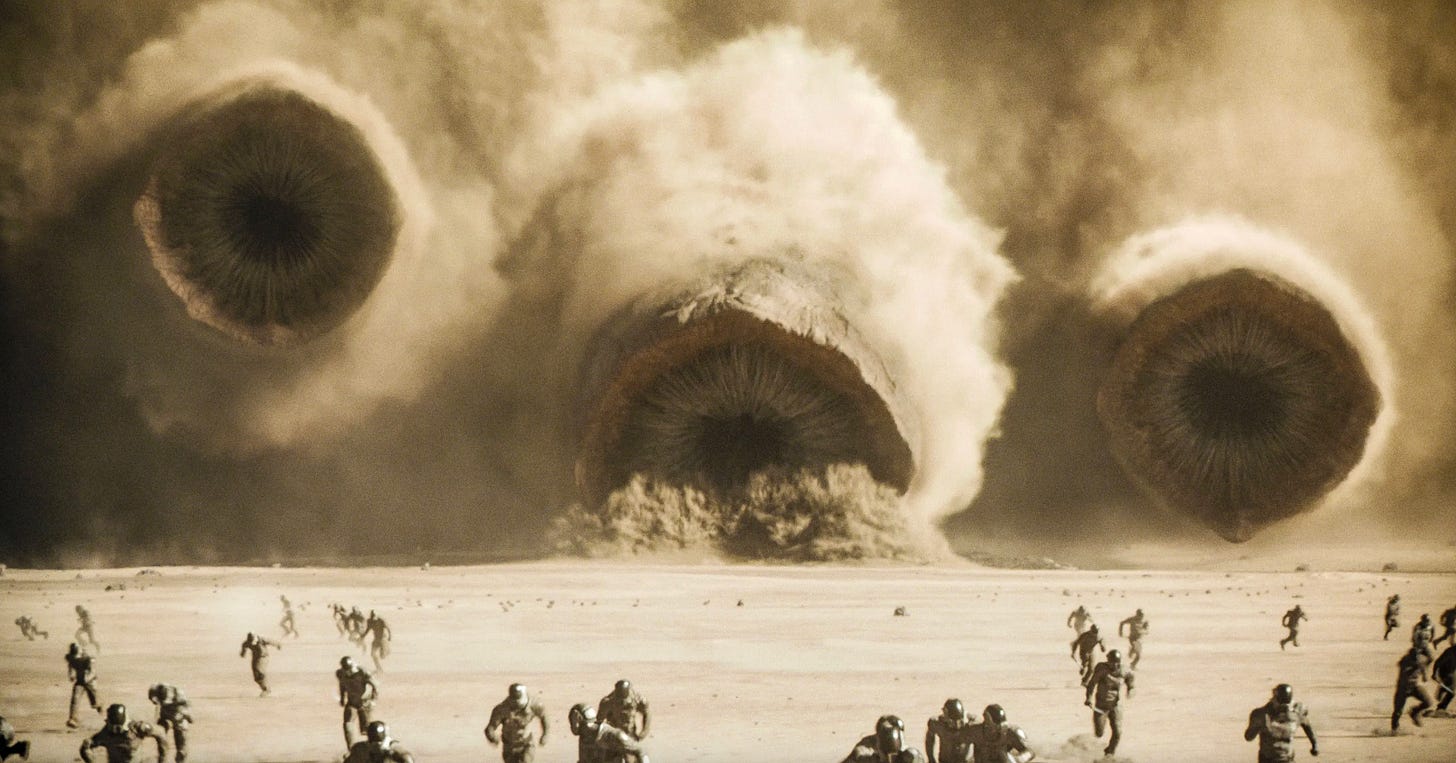Director Denis Villeneuve delivered the preeminent adaptation of author Frank Herbert’s Dune in 2021, but it was mired in an HBO Max debut and a Covid-era theatrical release that impressed the masses critically but failed to make the kind of massive box office waves that typically follow a release of its kind; a sci-fi adaptation of a renowned classic novel with a cast that includes a who’s who of modern A-list stars and character actors made by a filmmaker who has been heralded as one of the best new voices in cinema.
However, the lore of the film has built a strong cult following, much like the original 1984 adaptation from director David Lynch, which had similar star power for its era but failed to move the box-office needle due to a myriad of factors, not the least of which included Lynch’s wild and grotesque style that left many fans and critics baffled. Lynch’s Dune has gone on to become a true cult classic (as covered in Max Evry’s latest book about the making of it, A Masterpiece in Disarray, discussed on my Repackaged Wisdom podcast), and kept the fires burning long enough for Villeneuve to throw his hat into the ring.
Dune: Part 2 was greenlit days after the first film’s release, which allowed many cinephiles to breathe a sigh of relief seeing as the first film only covered half of Herbert’s famed novel. Knowing that the franchise would continue to cover at least the first novel was reassuring (there are 28 books in total thus far, with only the first six being written by Herbert before his passing). Now that Dune: Part 2 has been released and witnessed by those hungering for more “spice” it’s become evident that Villeneuve (and WB by proxy) have no plans to let the two-film adaptation serve as a completed saga, but rather the birth of a new cinematic universe.
This is both a good and bad thing for Dune: Part 2, which is an astonishing sci-fi film, but not on its own. The film is completely reliant on the events of the first film for anything to make sense to the average viewer, which is already asking a lot when it comes to the outlandish, cerebral, and wild aspects of the universe it exists in. Dune: Part 2 is more like the second part of a whole, much like Quentin Tarantino’s Kill Bill Vol. 1 & 2. Released separately, the two films are ultimately one film split into two (initially, Tarantino planned a one-film release, before breaking it apart).
If you look at a film series like The Terminator or The Matrix, they can easily be one-and-done films, but both had a series of sequels that tied much closer together than that first release. Dune, as it stands, is not in that category, but that doesn’t mean both films aren’t significant. They absolutely are, but I think that calling one better than the other is like saying the first half (or second half for that matter) of the book is better than the other. It’s all still the same book, and, in this case, the same movie.
With that said, Dune: Part 2 elevates everything that was set up in the first film, while still adhering to the formula and style that Villeneuve created. With the basic setup in place, we are now thrust deeper into the politics, maneuvering, and warfare that follows the upheaval of Dune: Part 1. Paul Atreides (Timothee Chalamet) and his mother, Lady Jessica (Rebecca Ferguson) find themselves ensnared in survival mode, living with the native people of Arrakis (The Fremen), led by Stilgar (Javier Bardem). However, Paul and Lady Jessica bring with them the gift and curse of prophecy, as both have destinies to be proven, which will change the state of their universe forever. I mean, that’s how these things go, right?
Dune: Part 2 takes its time in setting things up, but faces the same kind of momentum issues that Lynch’s version did, leaning into montage and expositional voiceover to do some of the heavy lifting when the going gets tough. If nothing else, it cuts Lynch’s version a little slack in those departments, which were heavily criticized upon its release. Herbert, it appears, is not an easy author to adapt by anyone. Still, most will agree that Villeneuve has executed the more successful version, which is also his most commercial film to date. His work on another sequel, Blade Runner 2049, is deeply adored, even if it flopped at the box office and was more brainy than action-y. His other sci-fi adaptation, Arrival, had similar praise but was also a more cerebral journey. Even his thriller Sicario was light on action and heavy on mood.
That’s not the case with Dune: Part 2. Rocket launchers, lasers, knife fights, sword fights, and more abound, with nuclear weapons also making an explosive appearance that delivers far more fiery punch than Christopher Nolan’s Oppenheimer, which is literally about the making of such a thing. It’s hard to call Dune: Part 2 rousing, at least in a traditional sense, as the film can’t help but carry a much darker tone than, say, something like Star Wars. Paul’s ascension through the Fremen as the “chosen one” isn’t a cheerful one, and he serves as a reluctant leader who evolves into one who accepts his fate implicitly after a sip of some sandworm blood.
This is one of the aspects that makes Dune: Part 2 stand out from similar sci-fi franchises. It’s mired in family tragedy, trauma, lies, deceit, and the kind of political maneuvering that you can dissect on The Artist Formerly Known as Twitter on a daily basis. None of it is black and white, and even as Paul, Lady Jessica, and Josh Brolin’s Gurney Halleck get their ultimate revenge for the attack on House Atreides, as well as the death of their Duke (Oscar Issac), it can’t help but feel bittersweet. What do they become in the wake of said revenge? Only Dune: Part 3 (and 4, 5, 6, etc.) will tell (and it’s a very odd, bleak journey).
Performance-wise, Dune: Part 2 is stacked with talent. Chalamet, Zendaya (as Chani), Bardem, Brolin, and Ferguson are joined by newcomers to the series Christopher Walken as The Emperor, Florence Pugh as his daughter, Princess Irulan, and Lea Seydoux as Lady Margot Fenring. On the Harkonnen side, Stellen Skarsgard is back as The Baron, with Dave Bautista returning as his sadistic nephew Beast Rabban, both of whom make deliciously fun and evil antagonists. However, everyone in the film is outshined by Austin Butler as Feyd-Rautha, a twisted, psychotic, and devilishly charming monster who slits the throats of his servants to test the strength of a knife and takes absolute pleasure in torturing his enemies.
Butler, who has already made waves in films like Once Upon A Time In Hollywood, Elvis, and Masters of the Air, is an absolute gem of a pick for the role of Feyd, which was stunt-casted in Lynch’s version with singer Sting. Butler brings a diabolical menace to the character of Feyd who’s less of a laughing madman and more of a sinister and conniving monster. Butler oozes fear and his scratchy voice and mannerisms make him every bit as terrifying and unpredictable as The Baron. In the wake of every comic-book movie villain and big bad coming up short, Butler’s Feyd is one for the record books.
Dune: Part 2 may be a darker kind of Star Wars when it’s all boiled down, but its uniqueness and visionary style make it a much better version than anything Lucasfilm has churned out since George Lucas threw in the towel. The spectacle put on display, particularly in the last half hour, is nothing short of an IMAX-lover’s dream, complete with massive explosions, charging armies, fist-pumping revenge, a vicious knife fight, and Fremen riding sandworms into battle like chariots of the gods. Although it is ultimately the start of an even darker turn in the books (those who have read beyond Dune will know what I’m talking about), it stands as a great cinematic start to the Dune franchise, which may or may not continue depending on box office and the desire of Villeneuve to return. If it continues without him, one will have to wonder if that makes it worse off, given how much of the director’s signature is on it.
While many critics call Dune: Part 2 a masterpiece or second coming of Christ (pun fully intended), I think it falls somewhere short of that, but still a magnificent spectacle full of epic filmmaking at its best. As with most films that strike a chord with critics, the wave of hyperbole with Dune: Part 2 is very real, with click-bait headlines fishing for a quote in a TV spot, some calling it the “best sci-fi film of the decade”. I mean, look, it’s really damn good, but it’s 2024 for fucks sake, we still have six more years of movies to decide if that statement is objectively true.
Where Dune: Part 2 falls short for me is in the inconsistent pacing, which teeters back and forth with long, drawn-out sequences mixed in with montages that make it difficult to discern how much time is passing between scenes. Perhaps a longer cut will help in that area if that ends up being something that Villeneuve pursues, despite saying he has no intention of releasing one for either film.
The other area that I feel both Dune: Part 1 and Part 2 fall short is the toned-down violence and gore. Lynch pursued some particularly grotesque and freaky aspects with his Dune film, but Villeneuve veers away from it altogether, to the point that it becomes unbelievable, even in the wild world it’s set in. Men are routinely put to the knife or sword, blown to bits, crushed, and beaten with nary a drop of blood. It’s almost as if his Dune films are made-for-TV edits when it comes to the portrayal of violence.
While it’s understandable that the series would pursue a PG-13, the authenticity of the world it inhabits is lessened tremendously when men are savagely cut down, but don’t seem to bleed at all. When throats are slit it’s done quickly and carried along with sound effects, rather than the visual punch that would greatly increase the emotional and visceral reaction to violence in the film. When it comes to war and the portrayal of it, there’s nothing more annoying than shying away from the reality of its impact, goofy sci-fi or not. Even Anakin Skywalker got chopped up and burned alive in a Star Wars movie.
Still, I’m able to look past my criticisms and recognize Dune: Part 2 for what it is; a refined visual treat that feels like the birth of a new franchise, thanks largely to the imagination of a masterful filmmaker and a cast that lends credibility and presence in spades. All involved have shaped something special with Dune and if the adaptations continue under their hands then we’re in for a treat (or not, as things just get weird as hell after the first book). If not, we still have a two-part film that will stand among the best sci-fi adaptations of all time and that’s more than enough spice to satisfy me.





